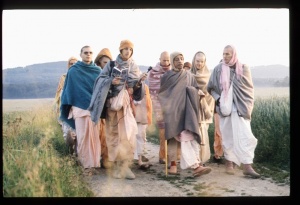SB 3.14.13: Difference between revisions
m (1 revision(s)) |
(Vanibot #0018 edit: make synonym terms in Sanskrit italic in SB - Vanisource) |
||
| Line 1: | Line 1: | ||
{{info | {{info | ||
|speaker=Diti, wife of | |speaker=Diti, wife of Kaśyapa Muni | ||
|listener= | |listener=Kaśyapa Muni | ||
}} | }} | ||
[[Category:Srimad-Bhagavatam - Canto 03 Chapter 14]] | |||
[[Category:Bhagavatam Verses Spoken by Diti, wife of Kasyapa Muni - Vanisource|031413]] | |||
<div style="float:left">'''[[Srimad-Bhagavatam]] - [[SB 3|Third Canto]] - [[SB 3.14: Pregnancy of Diti in the Evening|Chapter 14: Pregnancy of Diti in the Evening]]'''</div> | |||
<div style="float:right">[[File:Go-previous.png|link=SB 3.14.12]] '''[[SB 3.14.12]] - [[SB 3.14.14]]''' [[File:Go-next.png|link=SB 3.14.14]]</div> | |||
{{RandomImage}} | |||
==== TEXT 13 ==== | ==== TEXT 13 ==== | ||
<div | <div class="verse"> | ||
purā pitā no bhagavān | :purā pitā no bhagavān | ||
dakṣo duhitṛ-vatsalaḥ | :dakṣo duhitṛ-vatsalaḥ | ||
kaṁ vṛṇīta varaṁ vatsā | :kaṁ vṛṇīta varaṁ vatsā | ||
ity apṛcchata naḥ pṛthak | :ity apṛcchata naḥ pṛthak | ||
</div> | </div> | ||
| Line 16: | Line 22: | ||
==== SYNONYMS ==== | ==== SYNONYMS ==== | ||
<div | <div class="synonyms"> | ||
''purā''—in days long ago; ''pitā''—father; ''naḥ''—our; ''bhagavān''—the most opulent; ''dakṣaḥ''—Dakṣa; ''duhitṛ-vatsalaḥ''—affectionate to his daughters; ''kam''—unto whom; ''vṛṇīta''—you want to accept; ''varam''—your husband; ''vatsāḥ''—O my children; ''iti''—thus; ''apṛcchata''—inquired; ''naḥ''—us; ''pṛthak''—separately. | |||
</div> | </div> | ||
| Line 23: | Line 29: | ||
==== TRANSLATION ==== | ==== TRANSLATION ==== | ||
<div | <div class="translation"> | ||
In days long ago, our father, the most opulent Dakṣa, who was affectionate to his daughters, asked each of us separately whom we would prefer to select as our husband. | In days long ago, our father, the most opulent Dakṣa, who was affectionate to his daughters, asked each of us separately whom we would prefer to select as our husband. | ||
</div> | </div> | ||
| Line 30: | Line 36: | ||
==== PURPORT ==== | ==== PURPORT ==== | ||
<div | <div class="purport"> | ||
It appears from this verse that free selection of a husband was allowed by the father, but not by free association. The daughters were asked separately to submit their selection of a husband who was famous for his acts and personality. The ultimate selection depended on the choice of the father. | It appears from this verse that free selection of a husband was allowed by the father, but not by free association. The daughters were asked separately to submit their selection of a husband who was famous for his acts and personality. The ultimate selection depended on the choice of the father. | ||
</div> | </div> | ||
__NOTOC__ | |||
<div style="float:right; clear:both;">[[File:Go-previous.png|link=SB 3.14.12]] '''[[SB 3.14.12]] - [[SB 3.14.14]]''' [[File:Go-next.png|link=SB 3.14.14]]</div> | |||
__NOTOC__ | |||
__NOEDITSECTION__ | |||
Revision as of 18:07, 30 November 2017

A.C. Bhaktivedanta Swami Prabhupada
TEXT 13
- purā pitā no bhagavān
- dakṣo duhitṛ-vatsalaḥ
- kaṁ vṛṇīta varaṁ vatsā
- ity apṛcchata naḥ pṛthak
SYNONYMS
purā—in days long ago; pitā—father; naḥ—our; bhagavān—the most opulent; dakṣaḥ—Dakṣa; duhitṛ-vatsalaḥ—affectionate to his daughters; kam—unto whom; vṛṇīta—you want to accept; varam—your husband; vatsāḥ—O my children; iti—thus; apṛcchata—inquired; naḥ—us; pṛthak—separately.
TRANSLATION
In days long ago, our father, the most opulent Dakṣa, who was affectionate to his daughters, asked each of us separately whom we would prefer to select as our husband.
PURPORT
It appears from this verse that free selection of a husband was allowed by the father, but not by free association. The daughters were asked separately to submit their selection of a husband who was famous for his acts and personality. The ultimate selection depended on the choice of the father.